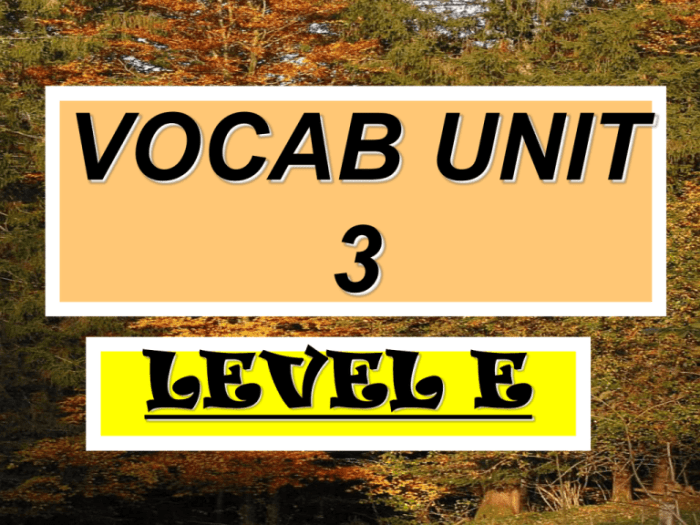Level e unit 3 choosing the right word – Embarking on Level E Unit 3: Choosing the Right Word, this comprehensive guide delves into the art of selecting appropriate words, empowering you to convey your ideas with precision and impact. Understand the significance of word choice in shaping meaning and tone, and discover strategies for navigating different contexts and audiences.
This journey will equip you with the tools and techniques to expand your vocabulary and elevate your communication skills.
Understanding Word Choice

Selecting appropriate words is crucial in effective communication. The right words convey the intended meaning, set the desired tone, and enhance the impact of the message. For instance, using “exquisite” instead of “good” to describe a painting conveys a more sophisticated and appreciative tone.
It’s equally important to consider the audience and context when choosing words. Formal settings require more precise and technical language, while informal conversations allow for colloquialisms and slang. Understanding the audience’s background, interests, and cultural nuances ensures that the message is well-received.
Strategies for Choosing the Right Word
Several methods can aid in selecting appropriate words. One common approach is using a thesaurus to explore synonyms and antonyms. Another strategy involves consulting dictionaries to clarify meanings and usage. Additionally, studying etymology can provide insights into word origins and connotations.
A step-by-step guide for choosing the right word includes:
- Understanding the intended meaning and tone
- Considering the audience and context
- Exploring synonyms and antonyms
- Consulting dictionaries and reference materials
- Considering cultural and linguistic nuances
The Role of Context and Nuance
Context plays a pivotal role in word choice. The same word can have different meanings and connotations depending on the situation. For example, the word “run” can refer to physical movement, a computer program, or a political campaign. Understanding the context helps avoid misinterpretation and ensures the intended message is conveyed.
Cultural and linguistic nuances also influence word selection. Words that are acceptable in one culture may be offensive in another. Similarly, words that have specific meanings in one language may not translate directly to another.
Tools and Resources for Word Choice, Level e unit 3 choosing the right word
Numerous tools and resources are available to enhance word choice. Online dictionaries and thesauruses provide quick access to definitions, synonyms, and antonyms. Language corpora, which are large collections of real-world text, offer insights into word usage and frequency.
Using these tools effectively involves:
- Identifying s and exploring their synonyms
- Understanding the context and tone of the text
- Considering the audience and their linguistic background
Practice and Examples
Practice exercises can help improve word choice skills. These exercises may involve selecting the most appropriate word from a list, identifying the correct meaning of a word in context, or creating sentences using specific words.
Examples of well-chosen words include:
- “Serendipitous” instead of “lucky” to describe an unexpected encounter
- “Abrogate” instead of “cancel” to convey a formal and authoritative decision
Questions and Answers: Level E Unit 3 Choosing The Right Word
What is the significance of word choice in communication?
Word choice plays a crucial role in shaping the meaning, tone, and impact of your message. It can convey emotions, establish credibility, and influence the reader’s perception of your writing.
How can I improve my word choice?
To improve your word choice, expand your vocabulary by reading widely, using online dictionaries and thesauruses, and studying language corpora. Practice using new words in your writing and speech.
What are some common strategies for choosing the right word?
Common strategies include considering the context, audience, and purpose of your writing. Identify the most appropriate word from your vocabulary or use a thesaurus to find synonyms that convey the desired meaning.
